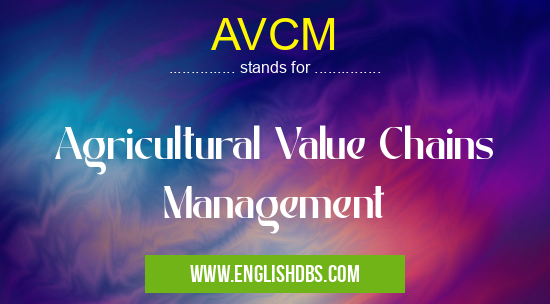What does AVCM mean in MANAGEMENT
Agricultural value chain management (AVCM) is a comprehensive strategic approach that looks at the entire supply chain from production to consumption. It helps to ensure that agricultural products are of high quality, safe for human consumption, and reaching the intended market in an environmentally sound manner. AVCM also involves creating efficient distribution networks, managing inventory levels, and providing necessary financial support to farmers. The intention behind AVCM is to ensure that all segments of the value chain are managed efficiently and effectively resulting in greater value for stakeholders and an improvement in livelihoods for farmers.

AVCM meaning in Management in Business
AVCM mostly used in an acronym Management in Category Business that means Agricultural Value Chains Management
Shorthand: AVCM,
Full Form: Agricultural Value Chains Management
For more information of "Agricultural Value Chains Management", see the section below.
» Business » Management
Definition
Agricultural value chain management (AVCM), sometimes referred to as farm-to-table logistics or food traceability management systems, is the process of managing the entire agricultural production-consumption pathway – from raw materials procurement through final delivery to consumers – with an aim toward reducing waste and optimizing resources. By considering each stage of the supply chain, practitioners can help reduce costs, improve product safety, ensure sustainability, maximize yields and boost farmer incomes by directly addressing underlying causes of failure in traditional value chains.
Benefits
By taking a holistic view of the entire agricultural supply chain process, AVCM helps identify areas where improvements can be made throughout the production lifecycle to increase efficiency and sustainability. This includes improving water use efficiency, reducing waste from post-harvest losses due to spoilage or other causes along with helping producers implement more sustainable practices overall. In addition, by providing economic incentives such as improved access to credit for farmers or increasing market access opportunities for smallholder farmers or those living in rural areas where transportation may be limited, AVCM can help improve livelihoods and boost growth in local economies. Finally, proper implementation of AVCM can help increase consumer protections by ensuring reliable food safety standards across the life cycle of a product have been met before it reaches its destination.
Essential Questions and Answers on Agricultural Value Chains Management in "BUSINESS»MANAGEMENT"
What is Agricultural Value Chain Management (AVCM)?
Agricultural Value Chain Management (AVCM) is an approach to managing the different stages involved in agricultural production, from farm to consumer. It looks at how a farm interfaces with different channels such as processing facilities, traders, retailers and end-users, in order to better understand the trade flows and optimize how resources like land and labor are used.
What are the benefits of using AVCM?
Using AVCM has several advantages such as improved resource efficiency, increased traceability throughout the supply chain, reduced post-harvest losses and improved price transparency for farmers. Additionally, it can lessen risk along the value chain by helping identify potential bottlenecks and ensuring that goods remain safe.
How does AVCM work?
The basic idea behind AVCM is that producers should view their value chains as interconnected networks of actors with shared interests. By understanding their needs and motivations, one can build alliances between these groups in order to maximize profits or minimize costs. This includes mapping out the most efficient routes for trading goods between actors along the chain, tracking costs and improving negotiation strategies in order to ensure that all participants get a fair share of profits.
What data do you need for an effective AVCM implementation?
The data needed for an effective implementation of AVCM will vary from one situation to another depending on what information is available or important to consider when making decisions about the agricultural value chain. Generally speaking though, this could include information about production costs, market prices, trade flows, weather patterns etc., that help inform decision-making within this complex environment.
How do you incorporate technology into an AVCM system?
Technology can play a significant role in helping streamline processes when implementing an AVCM system. This can be done through leveraging smart contracts automated payments systems or digital trackers which help track products throughout their journey through the supply chain . Additionally data analytics can be used to gain insights into customer behavior patterns or market trends which could potentially help improve performance.
What are some common challenges associated with implementing AVCM?
Some common challenges associated with implementing an AVCMs include a lack of coordination among stakeholders along the value chain , difficulties gaining access to reliable data , cost related issues such as high transaction costs , language barriers between buyers and sellers , legal impediments from governmental regulations etc..
Are there any ethical concerns surrounding using technologies related to Agricultural Value Chains Management?
Yes , there are certain ethical concerns surrounding technologies related to Avcm specifically regarding data privacy & security since sensitive information could be at risk if not managed properly . Additionally there may be implications concerning labor exploitation as automation processes may lead workers who lack adequate training being replaced by machines thereby reducing job opportunities ..
Final Words:
In conclusion, Agricultural Value Chain Management leverages data-driven information systems and advanced analytics to optimize production processes throughout the entire farm-to-table journey. By unifying data and insights from every step along this journey starting with raw material procurement through final delivery at retail locations or grocery stores –practitioners can ensure optimal resource utilization while uncovering opportunities for cost savings as well as improved environmental performance through deployment of sustainable practices such as reduced water usage rates when irrigating crops or improved energy efficiency during crop storage processes. Ultimately AVCM provides a comprehensive solution for businesses operating within complex agri-food ecosystems which results in increased profitability across all involved parties while contributing to social stability through improved farmer livelihoods and enhanced consumer protections when it comes time to consume food items sourced from these complex agri-food ecosystems.
